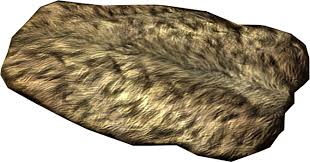
记忆方法
将“pelt”与“pellet”结合记忆,想象一串串小弹丸(pellet)以强烈的速度(像被猛力“pelt”向某物)击打或投掷过去。这种动作的连续性和力量感有助于记住“pelt”的意思。
以上内容由AI生成, 仅供参考和借鉴
中文词源
pelt 猛击,投掷
来自拉丁语pellere,击,打,推,驱打,词源同compel,propel.引申词义猛击,投掷。
pelt 动物毛皮来自拉丁语pellis,毛皮,皮革,来自PIE*pel,毛皮,皮肤,词源同film,peel,pell.
英语词源
- pelt
-
pelt: see fell, pellet
- pelt (v.)
- "to strike" (with something), c. 1500, of unknown origin; perhaps from early 13c. pelten "to strike," variant of pilten "to thrust, strike," from an unrecorded Old English *pyltan, from Medieval Latin *pultiare, from Latin pultare "to beat, knock, strike." Or from Old French peloter "to strike with a ball," from pelote "ball" (see pellet (n.)) [Klein]. Watkins says the source is Latin pellere "to push, drive, strike." Related: Pelted; pelting.
- pelt (n.)
- "skin of a fur-bearing animal," early 15c., of uncertain origin, perhaps a contraction of pelet (late 13c. in Anglo-Latin), from Old French pelete "fine skin, membrane," diminutive of pel "skin," from Latin pellis "skin, hide" (see film (n.)). Or perhaps the source of the English word is Anglo-French pelterie, Old French peletrie "fur skins," from Old French peletier "furrier," from pel.
权威例句
- 1. He drove his car through the gates at full pelt.
- 他驾车急速通过大门。
- 2. Some of the younger men began to pelt one another with snowballs.
- 一些年轻人开始相互投掷雪球。
- 3. Alice leapt from the car and ran full pelt towards the emergency room.
- 艾丽斯跳下车,拼命奔向急诊室。
- 4. The boy gave the bully a pelt on the back with a pebble.
- 那男孩用石子掷击小流氓的背脊.
- 5. Crowds started to pelt police cars with stones.
- 人群开始向警车扔石块。